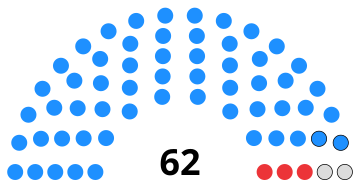Top Qs
Timeline
Chat
Perspective
2024 Cambodian Senate election
From Wikipedia, the free encyclopedia
Remove ads
Senate elections were held in Cambodia on 25 February 2024.[1][2] These were the fifth Senate elections in the country's history.
This article needs to be updated. (March 2024) |
Remove ads
Background
Summarize
Perspective
After resigning as prime minister in 2023, Hun Sen stated his intention to continue his political career as the President of the Cambodian People's Party (CPP), a member of the National Assembly, and the President of the Supreme Privy Council. After the Senate election on 25 February 2024, he announced his intention to also become President of the Senate.[3] In recent years, major opposition parties to Hun Sen's regime have been prevented from contesting elections due to controversial court rulings.[4] In the previous Senate elections in 2018, the CPP won all contested seats in the chamber after the dissolution of its main rival, the Cambodia National Rescue Party, which was believed to have been engineered by the government.[5]
On 5 September 2023, the Candlelight Party (CLP) was advised by the National Election Committee (NEC) to make every effort to locate the original registration document issued by the Ministry of Interior or obtain a new one in order to be eligible to vote in the Senate election. NEC spokesman Hang Puthea suggested that CLP leaders should try to locate the missing original paperwork or appeal to the Ministry of Interior to follow the legal process in order to obtain a new original document to register the candidates and parties at the NEC. According to CLP spokesman Kimsour Phirith, party officials wrote to Interior Minister Sar Sokha to address the issue with the party's registration documentation. According to him, the party is still exerting significant effort to request that the Ministry of Interior streamline the procedure and make it simpler for political parties to register.[6]
Remove ads
Electoral system
The Senate of Cambodia is elected every 6 years by an indirect party-list proportional representation through 8 multi-member constituencies (regions), with the Communal Chiefs, Communal Councilors, and members of the National Assembly.[7]
Remove ads
Candidates
Members of Senate not standing for re-election
Contesting Parties
Remove ads
Conduct
Allegations of irregularities
The Candlelight party alleged that its local councilors were targeted by attempts at intimidation and vote-buying. It added that provincial authorities aligned to the CPP were visiting Candlelight councilors asking them to stay away from polling stations or bribe them to vote for the CPP. The latter denied the claims, describing them as a "distortion of the facts."[14]
Remove ads
Results
Summarize
Perspective
Preliminary results released by the NEC showed that the CPP had won 55 of the 58 contested seats in the Senate, with the remaining four seats being filled by appointees of King Norodom Sihamoni and the National Assembly. The other three contested seats were won by the Khmer Will Party, a coalition of parties opposed to Hun Sen and a proxy of the Candlelight Party.[14][4] It also showed that the opposition had lost ground in Phnom Penh to the CPP by nearly half of its votes and by 30 percent in the surrounding Kandal Province.[14]
Results by region
Elected Senators
This section needs expansion. You can help by adding to it. (March 2024) |
Remove ads
Reactions
CPP spokesperson Sok Eysan said that the election results were better than expected for the party and said that it was likely that Hun Sen would become the new Senate president once the official results are released by the NEC in April.[4] Hun Sen was officially sworn in as Senate President following a unanimous vote by the chamber on 3 April.[16]
Exiled opposition leader Sam Rainsy said that the minor opposition gains in the election were encouraging signs for democracy and a victory despite challenges such as fear, threats and vote-buying.[4]
Remove ads
Notes
- Khmer Will Party named Son Chhay as its leading candidate, however Kong Molika was the central leading figure throughout the election.
References
Wikiwand - on
Seamless Wikipedia browsing. On steroids.
Remove ads
